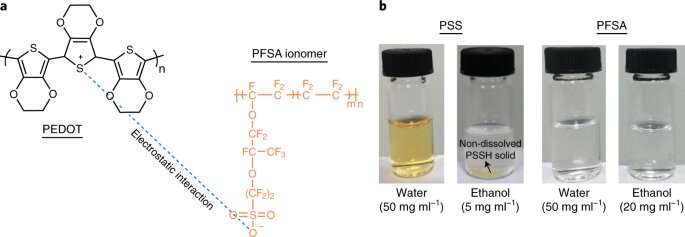A new conducting polymer complex to create stable and fully printable organic solar cells

In recent years, engineers worldwide have been trying to develop more sustainable technologies to produce electrical energy. One of the most promising among these solutions are organic solar cells.
Organic solar cells should be both efficient and stable, to ensure that they can operate reliably and for long periods of time. Ideally, they would also be printable using printing technology, as this would simplify their large-scale fabrication.
Hole-transporting materials (HTMs) are a key component of fully printable organic solar cells. One HTM that has been deemed promising for the development of printable organic solar cells is poly(3,4-ethylenedioxythiophene):polystyrene sulfonate (PEDOT:PSS), a classic conducting polymer complex that is often used to create printable devices. Despite its advantages, PEDOT:PSS generally disperses in water and exhibits a strong acidity, which can adversely impact the efficiency and stability of PEDOT:SS-based solar cells.
Researchers at Huazhong University of Science and Technology and the Institute of Materials for Electronics and Energy Technology (i-MEET) at Friedrich-Alexander-Universität Erlangen-Nürnberg have recently introduced a new alcohol-dispersed and conducting polymer complex similar to PEDOT:PSS that overcomes some of the polymer complex’s shortcomings. This polymer complex, dubbed PEDOT:F, was introduced in a paper published in Nature Energy.
“The group has been working on conducting polymer of PEDOT:PSS since it was built up in 2013. The PEDOT:PSS have drawbacks of strong acidity, poor wetting and moisture absorption. Those deteriorate device efficiency and stability,” Yinhua Zhou, one of the researchers who carried out the study, told TechXplore.
The key objective of the recent work by Zhou and his colleagues was to overcome the limitations of PEDOT:PSS and enable its use for the development of efficient, stable and printable organic solar cells. To do this, they created a new polymer complex formulation that can be dispersed in both water and alcohols.
“PEDOT:PSS was invented in 1990s and researchers have been complaining about its drawbacks from 2000 to today, but without introducing viable solutions,” Zhou said. “The new formulation of alcohol-dispersed formulation reported in this work overcomes these drawbacks.”
PEDOT:F, the new polymer complex introduced by the researchers, has perfluorinated sulfuric acid ionomers as counterions. In contrast with those contained in PEDOT:PSS, these ionomers can be dispersed in both water and alcohol.
“The new formulation of PEDOT:F is alcohol-dispersed, which overcomes these drawbacks of traditional PEDOT:PSS,” Zhou explained. “The PEDOT:F helps device efficiency and stability. It also opens the opportunity to fabricate optoelectronic devices with new architectures.”
The new alcohol-dispersed polymer complex introduced by this team of researchers has excellent wetting properties and a low acidity. As a result, it could help to overcome the shortcomings of water-dispersed PEDOT:PSS.
Using their new formulation, Zhou and his colleagues created organic photovoltaics that can be printed in full, from their bottom to their top electrode. These devices exhibited a power conversion efficiency of 15% and remarkably retained 83% of their initial efficiency under continuous illumination at a maximum power point tracking for a total of 1,330 hours.
“In our next studies, we plan to devise new PEDOT:F formulations,” Zhou added. “We also plan to used PEDOT:F to create new large-area and flexible devices.”
Youyu Jiang et al, An alcohol-dispersed conducting polymer complex for fully printable organic solar cells with improved stability, Nature Energy (2022). DOI: 10.1038/s41560-022-00997-9
© 2022 Science X Network
Citation:
A new conducting polymer complex to create stable and fully printable organic solar cells (2022, May 23)
retrieved 23 May 2022
from https://techxplore.com/news/2022-05-polymer-complex-stable-fully-printable.html
This document is subject to copyright. Apart from any fair dealing for the purpose of private study or research, no
part may be reproduced without the written permission. The content is provided for information purposes only.
For all the latest Technology News Click Here
For the latest news and updates, follow us on Google News.
